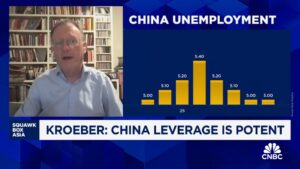 |
| Arthur Kroeber |
China is pondering to throw in a currency deal in its trade negotiations with the US, maintaining the value of the Renminbi, to pacify the doves in the White House. But that might be a wrong idea, say analysts like
economist Arthur Kroeber, who point at Japan. Japan agreed to a currency deal in 1985 as has paid for it dearly,
writes the South China Morning Post.
The South China Morning Post:
Amid reports that the United States will demand that China stop devaluing its currency as part of any trade agreement, Beijing has been urged to learn from the cautionary tale of Japan, which in 1985 agreed to a currency deal which has shouldered a good portion of the blame for its economy’s disastrous “lost decade”.
The US demands that China limit the yuan’s depreciation have been compared with the Plaza Accord, under which Japan, France, Germany, the United Kingdom and the US agreed to push the value of the US dollar down against the Japanese yen and German Deutsche mark.
The five countries began selling large amounts of US dollars, leading to a significant loss in dollar value.
The intervention resulted in the Japanese yen doubling in value against the US dollar in under two and a half years...
The clause demands that currencies are market-determined and that signatories avoid competitive devaluation, as a means of gaining a competitive advantage in trade.
It is the first time such a clause had been included in a major trade agreement.
China has previously signed up to to commitments at the G20 and International Monetary Fund that bar it from competitive devaluation.
However, critics claim that China has not upheld these commitments. In an interview with the Financial Times last year, US Treasury Secretary Steven Mnuchin noted that the yuan had fallen significantly over the course of 2018.
“As we look at trade issues there is no question that we want to make sure China is not doing competitive devaluations,” he said.
Arthur Kroeber, co-founder and research head at Gavekal Dragonomics, said that a currency agreement would be aimed at satisfying the demands of Mnuchin, a more dovish presence in the US administration, compared to hardliners such as US trade representative Robert Lighthizer.
“An exchange rate agreement is just a way for Beijing to collude with Trump administration doves like Stephen Mnuchin to trumpet a non-event as a big US victory,” Kroeber wrote.
Former US Federal Reserve chair Janet Yellen last week that it is “difficult and treacherous” to define when a country is manipulating its currency, warning US trade negotiators to think twice about asking China to maintain a stable yuan exchange rate.
More at the South China Morning Post.
Arthur Kroeber is a speaker at the China Speakers Bureau. Do you need him at your meeting or conference? Do get in touch or fill in our speakers' request form.
Are you looking for more strategic experts at the China Speakers Bureau? Do check out this list.
 Leading economist Arthur Kroeber, author of China’s Economy: What Everyone Needs to Know®
Leading economist Arthur Kroeber, author of China’s Economy: What Everyone Needs to Know®, explains at CNBC why China can walk away from a trade agreement with the US if they do not like it, although its economy is not very bright at this stage. He does not expect to see any great push to improve consumption or the economy at large, as the leadership is happy with the current modest growth.






